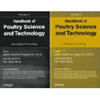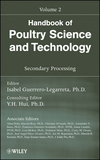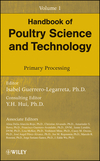Science unveils new pathway to broiler chicken growth performance

A new tool has emerged for broiler chicken operations seeking new ways to optimize results while keeping aligned with a full range of the latest organic, raised without antibiotics (RWA) and conventional market opportunities.
New study results showcased at the Poultry Science Association annual meeting, July 15-18 in Montreal, add to a growing body of science showing the unique potential offered by ‘Yeast Bioactives’ – a new form of feed technology pioneered and introduced by Canadian Bio-Systems (CBS Inc.).
“We are very pleased with the results we are seeing with this new feed technology,” says producer Mike Edwards of Edwards Family Organics near Millbank, Ont., a family-run farm that includes the broiler chicken operation where the trial was conducted. “It’s a new tool that has become a valuable part of our overall production approach – in particular, helping us to lower our bacterial challenges and promote better gut health. We’re seeing less issues. We’re achieving significant improvements in growth performance. It’s exciting to have a tool like this come into the marketplace that is eligible for use in organic.”
Expanding the toolbox for chicken farmers
Yeast Bioactives technology, launched in late 2018, is a yeast-based innovation designed for use as a feed supplement in diets for poultry, swine and ruminants. The technology features enzymatically hydrolyzed yeast carbohydrates that offer advantages over conventional yeast cell wall supplements (the enzymatic hydrolyzation process makes the yeast carbohydrates more soluble and thus more effective).
Yeast Bioactives offers benefits as an enhanced yeast technology supporting an optimal environment for animal wellness, performance and related productivity, says Paul Garvey, Poultry Sales Manager with CBS Inc. It also offers benefits as a grain management technology, helping to mitigate a number of potential threats that can undermine feed quality, animal performance, animal health and food safety. As a bio-based feed ingredient, it is the type of solution favored not only on-farm but also by major retailers and by consumers.
“The poultry industry has the potential to continue as one of the most progressive and successful sectors in agriculture, but as it continues to diversify and evolve there is a strong need for new options in the toolbox at the producer level, particularly for operations targeting reduction or replacement of antimicrobial use,” says Garvey. “The results we’re seeing with Yeast Bioactives on commercial poultry farms point to this as a very effective option to support highly productive and sustainable operations across all types of production.”
Helping meet today's new expectations
Edwards Family Organics is an early adopter of the Yeast Bioactives technology via Maxi-Nutrio, which received approval for use in certified organic production in 2018 and has seen steady adoption in all forms of poultry operations. Mike and Krista Edwards, who have a young family with three children, were one of four applicant families approved as a new entrant to the industry in 2017, under the Chicken Farmers of Ontario’s New Entrant Program. Their relatively new broiler chicken operation is certified organic and places on average 17,500 birds. Mike is also Manager of Nutritional Services at Jones Feed Mills Ltd. and has over a decade of experience working in the feed and nutrition business, including with a specific focus on poultry production including supporting organic producers with the Yorkshire Valley Farms group.
“Yeast Bioactives technology fits well with the unique challenges of operating under certified organic requirements,” says Edwards. “Our operation along with others using it in our organic producer association are now getting results comparable to conventional producers. A number of our producers are actually producing well ahead of the provincial averages for conventional production.”
Organic results meet or exceed conventional
The trial results unveiled at the Poultry Science Association meeting confirm advantages that the Edwards’ farm and other early adopters have seen over the past several months, while providing valuable information on dosage response, he says. “The trial data will help us drill down to the optimal rates we want to use.”
The trial involved a total of 16,320 newly hatched Ross 708 broiler chicks. The study was designed to evaluate the effects of dietary supplementation with a commercially available Yeast Bioactives product (Maxi-Nutrio) on performance and health of broiler chickens raised under a commercial organic production system. A subsample of 360 birds were randomly selected and placed in 18 identical floor pens with 20 birds / pen for a 28 day feeding study.
The experimental pens, which provided 966 cm2 per bird of floor space, were located within the barn and were fitted with individual feeders and waterers. Birds were randomly assigned to one of three dietary treatments with or without Maxi-Nutrio supplementation (one without, one step-down dose and one full dose). Results showed clear growth performance advantages with Maxi-Nutrio supplementation, with the most pronounced beneficial effects observed in the full dose treatment (1 kg/tonne).
Feed technology built for the future
“Even with the inherent stressors of an organic system, the results shown during the trial were very strong,” says Rob Patterson, CBS Inc. Technical Director. “With the rising popularity of organic and RWA approaches, and the overall shift in production approaches toward a preference for bio-based solutions, we see the adoption of this type of enhanced yeast feed technology continuing to expand. It’s an important part of our portfolio of CBS Inc. Feed Science Platforms.”
For more information visit www.canadianbio.com. Information on the Poultry Science Association is available at www.poultryscience.org.
Looking for a reprint of this article?
From high-res PDFs to custom plaques, order your copy today!









